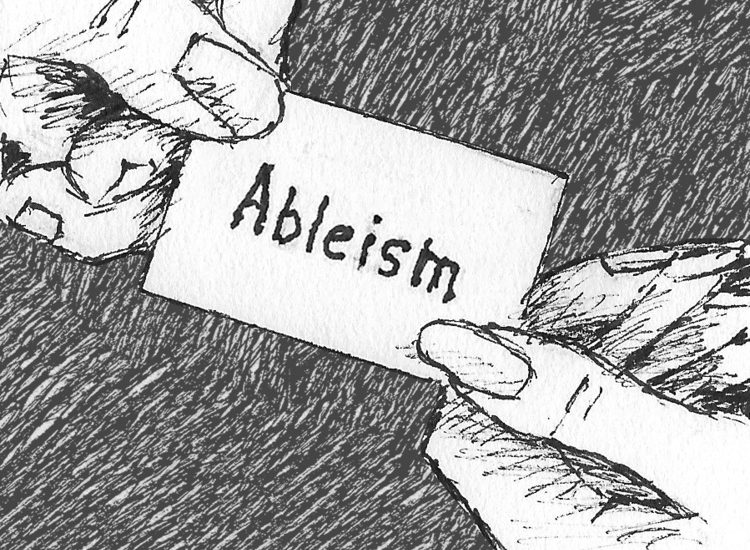
Ableism, often defined as discrimination or prejudice against people with disabilities, is an ever-present reality in disabled people’s lives. It is so prevalent, in fact, that we sometimes fail to notice the many small ways it appears in our everyday existence. We become resigned to inaccessible buildings or to the lack of American Sign Language interpreters at public events. We become accustomed to the pervasive lack of Braille or electronic materials and of screen-reader accessible web applications. We are unsurprised by public spaces that are impossible to navigate because they are in poor condition or are designed without conceiving of blind or neuro-diverse users.
All too often, we decide not to raise these issues of exclusion because we are tired of being portrayed as difficult, demanding, or too expensive and troublesome to include. Yet every once in a while, and arguably more often than we would like, it becomes painfully obvious that a public display of ableism requires an equally public response.
The recent board of inquiry decision that acknowledged the blatant violation of human rights in the institutionalization of three disabled Nova Scotians served as one of those stark reminders for me. It was inexplicable that such a finding could be accompanied by the denial of systemic ableism in the policies and practices preventing thousands more disabled individuals from living their lives in community. I was exasperated by the callous dismissal of Dr. Catherine Frazee’s compelling analysis of how ableism pervades our systems of support for individuals labelled intellectually disabled. Although I was unsurprised that Dr. Frazee’s expertise was discounted by an able-bodied board of inquiry chair, I found his complete disregard for the role his privilege played in allowing him to claim he had “Never seen a taint of the ableism Dr. Frazee described” utterly shocking.
Our province has just enacted legislation that promises an accessible Nova Scotia by 2030, and they have committed to privileging disabled voices in all implementation processes. Yet it is clear to me that this work must be complemented by serious conversations about ableism and its impact on the lives of disabled Nova Scotians. Claiming that ableism is non-existent as an able-bodied individual and then centring that argument to dismiss the expert analysis of a disabled woman whose career in human rights, disability activism, and research is widely respected serves as a powerful example of how ableism actually works. It silences disabled voices, disregards disabled experts, and only affirms the existence of discrimination when non-disabled people claim it occurred.
Describing ableism only in terms of discrimination against disabled people fails to capture the essence of ableism’s power to oppress. Discrimination is an intensely felt outcome of ableism, but the origins of such discrimination rest in deeply held beliefs that disability is undesirable, unwanted, and a burden on individuals, families, and society. The result is very clearly a group of people, disabled people, who experience constant devaluation and exclusion.
Decisions impacting our lives are generally said to be supported by expert evidence that routinely ignores research produced by disabled experts in any given field. The recent report from the commission on inclusive education, for example, relied on the work of non-disabled researchers even though numerous disabled scholars are making important contributions to the field. Disabled people are similarly being left out of the ongoing discussions on implementation, and our recommendations about teacher education and professional development are all too often discounted by government.
In our daily lives, we are left to make our way in a society that does not expect us as regular participants. Missing or poorly placed wheelchair ramps tell us only ambulatory people are expected. No Braille or auditory announcements in elevators tells us only sighted people are anticipated as independent elevator users. Lack of ASL interpretation at public events tells us that Deaf participants have not been encouraged to attend. Retroactive accommodation is progress, but it still points to our automatic tendency to attend to disability as an after-thought.
How can we disrupt the pervasive presence of ableism in the life of our province? By remembering that we have a breadth and depth of disabled experts whose knowledge and experience should inform all disability-related decisions. By making space for disabled people at all levels of decision-making in government and public institutions, and by valuing disability as diversity rather than simply enacting procedures to accommodate its presence. We cannot continue to sideline disabled people because the perspectives they bring highlight the uncomfortable realities of ableism in society, and we cannot claim we are doing our best when evidence suggests otherwise. We have work to do if we want to reposition disability as an issue of equity and human rights. Let’s do that work collaboratively as we aim to be accessible by 2030.
Dr. Cynthia Bruce is a blind disability activist and faculty member in Acadia University’s School of Education. Follow her on Twitter @blindacademic
With a special thanks to our generous donors who make publication of the Nova Scotia Advocate possible.
Subscribe to the Nova Scotia Advocate weekly digest and never miss an article again. It’s free!




Well said, Dr. Bruce!
Excellent piece, accurately expresses our reality as a society and challenges us to move the Inclusion agenda foreword, as we MUST!
Walter Thompson., the one-person Board of Inquiry Cynthia mentions, describes himself thusly: “If I am speaking from a position of privilege and am “un-woke”, then so be it.”
I guess “un-woke” means “asleep”. “Privilege” is from Latin privilegium “law applying to one person, bill of law in favor of or against an individual”.
“So be it” has 66 similar phrases in Power Thesaurus. My favorite in this context is “tough luck”, but “too bad” or “so whatever” are equally expressive. So is “suck it up”.
In defining his universe, Thompson clearly invites Cynthia’s challenge. Don’t get me started on ableism, but there is an even bigger issue – impartiality. Thompson didn’t say he was unconvinced, he said “I do, however, feel obliged to resist Dr. Frazee’s evidence”. Think about it. Is this the statement of a person willing to hear the evidence, or a statement from somebody who has made up their mind?
“I’m sure the sun revolves around the earth Mr. Galilei, so whatever you say you won’t -convince me”.
The Human Rights Commission should appoint Inquisitors who are a but more broad-minded. Any party can appeal a board of inquiry decision – the Human Rights Commission further damages its precarious reputation if it allows this decision to stand.
Thanks, Dr. Bruce, for this excellent description of the pervasiveness and consequences of ableism in our society. I am shocked by the board of inquiry’s response to Catherine Frazee’s evidence. The chair not only dismissed Dr. Frazee’s evidence, but found it his duty to reject it, saying he felt “obliged to resist”. Has he been living in another province? in another country?